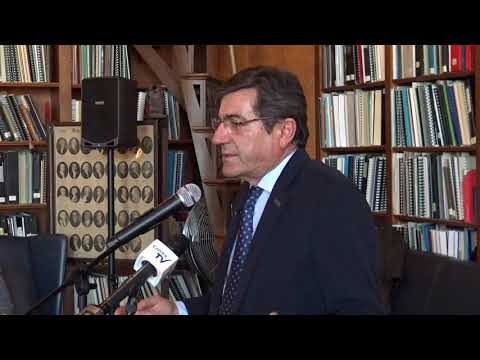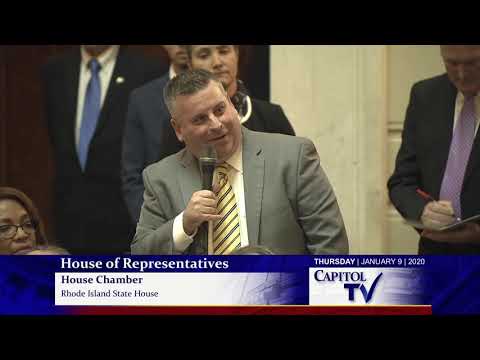Dr João Goulão, architect of Portugal’s drug policy, shares his success with the General Assembly
“Nowadays we have the lowest rates of overdose deaths in Europe,” said Dr João Goulão. “We had 38 deaths in 2017, a country of 10 million inhabitants. If you had the same rate of overdoses [here in Rhode Island], you should have three or four a year, and you are having 300.” Dr João Goulão is credited as being an
January 11, 2020, 10:31 am
By Steve Ahlquist
“Nowadays we have the lowest rates of overdose deaths in Europe,” said Dr João Goulão. “We had 38 deaths in 2017, a country of 10 million inhabitants. If you had the same rate of overdoses [here in Rhode Island], you should have three or four a year, and you are having 300.”

Dr João Goulão is credited as being an architect of Portugal‘s drug policy. Established in 2000, this revolutionary drug policy maintains the illegality of using or possessing any drugs for personal use without authorization, but the offense was no longer criminal but administrative if the amount possessed was no more than a ten-day supply. Substance use is seen as a health issue in Portugal, not a criminal issue.
And the results have been extraordinary.
Dr Goulão was in Providence on Thursday, visiting the Rhode Island State House at the invitation of State Representative Scott Slater (Democrat, District 10, Providence) to talk about Portugal’s drug policy. Slater introduced legislation last session to reclassify possession from a felony to a two year misdemeanor, and plans to reintroduce the bill this year. Other States that have done this, including Connecticut, have seen great successes in terms of supporting people in recovery.
Here’s the video of Dr Goulão’s talk at the State House Library:
“I want to say that in Rhode Island, particularly in Providence, you have all the tools available to [take] steps towards considering drug addiction as a disease instead of a crime. And that makes all the difference. Of course people may talk about the differences [between] the health systems that we have. For instance, we have a universal health service available for everybody. That’s not the case in your reality, but you are taking the necessary steps to make care available for those in need of it, so that’s not an excuse to not take this step. I believe that you have the conditions to do so [here] and it really makes all the difference.
“Traditionally, drug addiction problems [are understood to occur] among minorities, in the ghettos… But nowadays, the epidemic that you are facing here in the States with the opioids is [affecting] all social groups. It’s no longer something that happens to others. It’s something that happens in your families, in every family. And this is a moment to think, ‘Okay, why should I consider my son, my nephew, as a criminal? He’s a sick person in need of health.’ And this makes all the difference.

“Using drugs is still prohibited in my country. It’s not liberalized or approved of by society. On the contrary, there’s a strong sign of social disapproval for drug use, but when people fall into addiction, [it is] like a disease, a chronic relapsing disease. People are considered as a sick person and they must access treatment with the same dignity as people who suffer from other diseases.
“Other diseases are a result of our behavior. Some sorts of diabetes, for instance, depend on what we eat. But nobody even thinks about putting a diabetic in prison because he eats too much sugar. We may consider this is a self-inflicted disease, [as in] ‘You are addicted because you wished [to be].’ No, I’m not diabetic because I wished to be diabetic. I am probably weak. There are some things in my genes, some things that drive me to abuse sugar or sweets or whatever.
“If I smoke cigarettes and I get lung cancer, no one puts me in jail. I’ll be offered treatment. I’ll be treated with dignity even if it comes from my wrong behavior. Why put people who use drugs in jail? In my country, we were facing an epidemic with the same dimensions that you are facing now with opioids. In the eighties, nineties, we were facing a Heroin epidemic. It was affecting 1 percent of our population, 100,000 people hooked on heroin. As happens here now, [addiction] was affecting every family. It was impossible to find a Portuguese family that had no problems connected to it. We respond by building a network of health services addressing that problem, and then decriminalizing.
“The way we did it is we established a limit for the possession of drugs.
“We have drugs law that come from 1993 that is quite a tough law inspired by the war on drugs. In 2000, we changed one article of that law, the article that deals with possession for use. We established a limit for possession of drugs and that limit is calculated on the basis of personal use for 10 days. If someone is intercepted by the police, in possession of drugs, he is still taken to the police station. The drug is a apprehended, is weighted and if he has more than [a 10 day amount] he is sent to the criminal justice system as before. [Then it is] up to the trial, up to the judge, up to the lawyers to discuss and to decide if he is dealing drugs or not. If he’s actually dealing drugs, he may end up in prison as before.

“But if the citizen has less than than that amount, he is just [told] by the police to present himself before a panel under the Ministry of Health, which is composed of a psychologist, a social worker and the lawyer, and they are going to assess, to discuss with the person, ‘What kinds of drug use does he have and what kind of needs does he have? Are you someone addicted in need of treatment?’ Okay, we can manage. We can arrange a treatment, easily accessible tomorrow. You can start if you want.
“If there is someone who is not addicted – someone playing with drugs, someone using drugs for recreational proposes – even then the panel tries to assess what kind of needs does this person have or what kind of use, what kind of conditions, how is his family, how is his work, where does he or she move and what kind of difficulties is he or she facing in life? How can we help to deal with those difficulties in order to avoid the existing use of drugs along with those problems that lead him or her to a more problematic use later on.
“This is effective. Much more than putting people in jail for two, three, 10, 20 years. People can be sent back to society. People can be reintegrated in society much more [easily] than through the criminal systems, through prisons, through all of those those difficult stages in life.
“In 2001, we have the complete set of strategies put together. We have had an evolution in our data that is really impressive. Nowadays we have the lowest rates of overdose deaths in Europe. We had 38 deaths in 2017, a country of 10 million inhabitants. If you had the same rate of overdoses [here in Rhode Island], you should have three or four a year, and you are having 300.
“This is key and this is easy. This is easy to do. In the beginning we had some resistance from law enforcement partners [saying], ‘We are going to lose efficiency in dealing with drugs.’ 20 years later, they are the happiest guys in the world. Why? Because they are free of all the tasks that seemed to be not useful in dealing with the drug users on the street, arresting them and introducing difficulties in their lives. In terms of effectively combating trafficking activities, it was not really efficient. As [law enforcement] got free of all those tasks, they could address big, really big criminal organizations that perform bulk trafficking. Nowadays, by the end of the year, when [law enforcement] show their results, instead of showing grams or kilos that they seized on the street, they show tons that they apprehended in big shipments in containers on open sea.
“It’s a completely different way to work, but much more efficient when the goal is to lower the availability of drugs on the street. When we adopted this law, at a political level, it was difficult. It was not easy. The common citizen was very much in favor. As I said, everybody had someone in their families afflicted by the problem. But at the political level, seen by ideological points of view it was much more complicated. Left-wing parties supported the idea, right wing conservatives were opposed. Nowadays there’s a complete consensus in our society. Nobody even thinks about going back, because the results speak for themselves. And that’s the case with overdoses, that’s the case with the efficiency of law enforcement combating drug traffic, that’s the case with HIV infections, that’s the case with stigma.
“That’s the case with the total number of addicted people, with problematic drug users. We started from 100,000 people using heroin. Nowadays we have less than 50,000 people depending on any drug and from those, 30,000 are following treatment programs. So it’s a completely different situation. Sure, we did not solve all our drug problems. We have new challenges. We are preparing to face the challenge of fentanyl that will arrive. We still do not have fentanyl in Europe in the same proportion that you are facing here and we intend to learn with you to deal with that problem. But this is a global problem. This is not a reality in Europe, or at least in Portugal, as it is here. But we must prepare because in the globalized world we are living in, it will arrive.
“I feel that we have the tools to address new challenges as they appear. We are prepared for that. And we can offer to our dependents safer opioids such as methadone or buprenorphine. Instead of having them using fentanyl on the street, we can offer them safe injecting places. We can offer them drug checking sites where people can test the drugs before using them. So a comprehensive policy of harm reduction policies along with treatment, prevention, reintegration – in this context of criminalization. This is our experience. We are not willing to sell our model but I personally am very happy to have this opportunity to share it with you. It is up to you to decide. We are in the house where decisions are made.”
Here’s video of Slater introducing Dr Goulão on the House floor:
Elected officials attending Dr Goulão’s presentation including Representatives Edith Ajello (Democrat, District 1, Providence), Rebecca Kislak (Democrat, District 4, Providence), Joseph Solomon Jr (Democrat, District 22, Warwick), James Jackson (Democrat, District 26, West Warwick), Justine Caldwell (Democrat, District 30, East Greenwich), Julie Casimiro (Democrat, District 31, North Kingstown, Exeter), Blake Filippi (Republican, District 36, Charlestown, New Shoreham, South Kingstown, Westerly), Bernard Hawkins (Democrat, District 53, Smithfield), Jose Serodio (Democrat, District 64, East Providence), Liana Cassar (Democrat, District 66, Barrington, East Providence), June Speakman (Democrat, District 68, Bristol, Warren), Susan Donovan (Democrat, District 69, Bristol) and Terri-Denise Cortvriend (Democrat, District 72, Portsmouth) and Senators Gayle Goldin (Democrat, District 3, Providence), Gordon Rogers (Republican, District 21, Coventry, Foster Scituate, West Greenwich) and Bridget Valverde (District 35, North Kingstown, Narragansett).


UpriseRI is entirely supported by donations and advertising. Every little bit helps:
Become a Patron!








